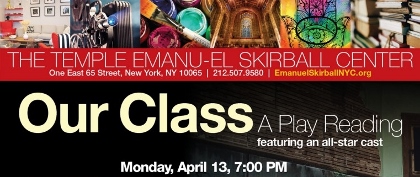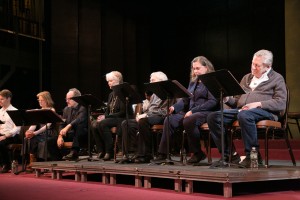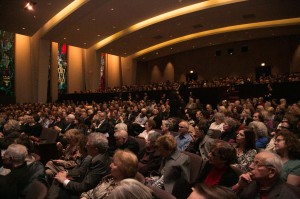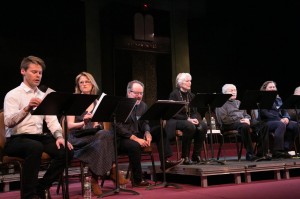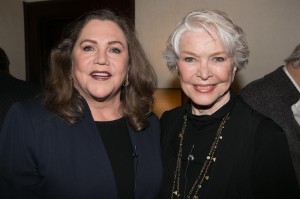FIRST CLASS
Directed by Cosmin Chivu, the staged reading of Tadeusz SÅ‚obodzianek’s play Our Class at the Skirball Center is everything one would expect from such an enterprise when put together with intelligence and good taste, and utilizing outstanding talent’”Ellen Burstyn, Kathleen Turner, Austin Pendleton, John Pankow, Mamie Gummer, Brian Murray, Alvin Epstein, Boyd Gains, Grant Kretchik, and Randy Harrison. But while the performers do a fine job of presenting the material, with lovely musical interludes by Jesse Selengut, the real power of the show is the play itself. Our Class begins a few years prior to the start of WWII with ten children’”Polish and Jewish friends/classmates’”in a schoolroom in a village in Poland, and follows these individuals to the end of their lives; at the dramatic center of the play is an incident (based on an actual event) that occurs in 1941 during the Nazi occupation, which involves the Poles gathering all the Jews they can find in their village’”as many as 1600’”locking them in a barn and burning them alive.
Unlike so many of the misguided works that deal with the Holocaust and Holocaust-related subjects, there is no trace of any extra-artistic agenda in Our Class. There is no sentimentality, no cynicism, no emotionally manipulative hocus-pocus, and there is never that sense, often felt with heavily researched historical fiction, that everything is accurate but nothing feels authentic. And although I’m sure this project required significant research, it is to Mr. SÅ‚obodzianek’s credit that everything in his play feels organic and truthful, as though written by the inner voices of the classmates themselves.
Besides the masterful way in which Mr. SÅ‚obodzianek builds tension and creates drama while keeping characters and events firmly anchored in “historical reality,” what I find most astounding about Our Class is the unprejudiced precision with which he dissects these people’s moment-to-moment thoughts, feelings and motivations. In one scene, when the former classmates are in their twenties, three or four of them, all Poles, savagely beat a Jewish classmate in the street. One of the Poles’”the instigator, Rysiek’”admits to us that he feels bad for his Jewish friend’”a sincere confession’”just as he digs a heavy cobblestone out of the road and crushes the young Jew’s head with it. In another scene a young Jewish woman is being gang-raped by the same three Poles’”she too was their classmate’”and amid her feelings of disgust, humiliation and horror she finds herself also experiencing a certain amount of arousal, specifically with respect to Rysiek. She is sickened by this sensation and hates herself for it. It makes her question who she is as a person and turns her spiritual world inside out’”not the rape but the few moments of pleasure she experiences during it.
Our Class is full of these kinds of unexpected, horrific contradictions, which Mr. SÅ‚obodzianek teases out of his characters like sinew. It is his insight into these people that make this work transcendent and self-contained. For all the awful things that happen in it, Our Class has the cathartic power of high art, and whether as a staged reading or as a full-on production, it demands to be seen.
photos by Nomi Ellenson
Our Class
The Temple Emanu-El, Skirball Center
10 East 66th Street
played on Monday, April 13 at 7pm
for more info, call 212.507.9580 or visit www.emanuelskirballnyc.org
